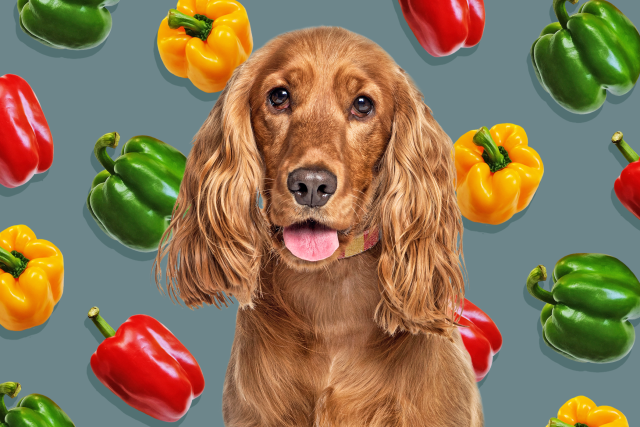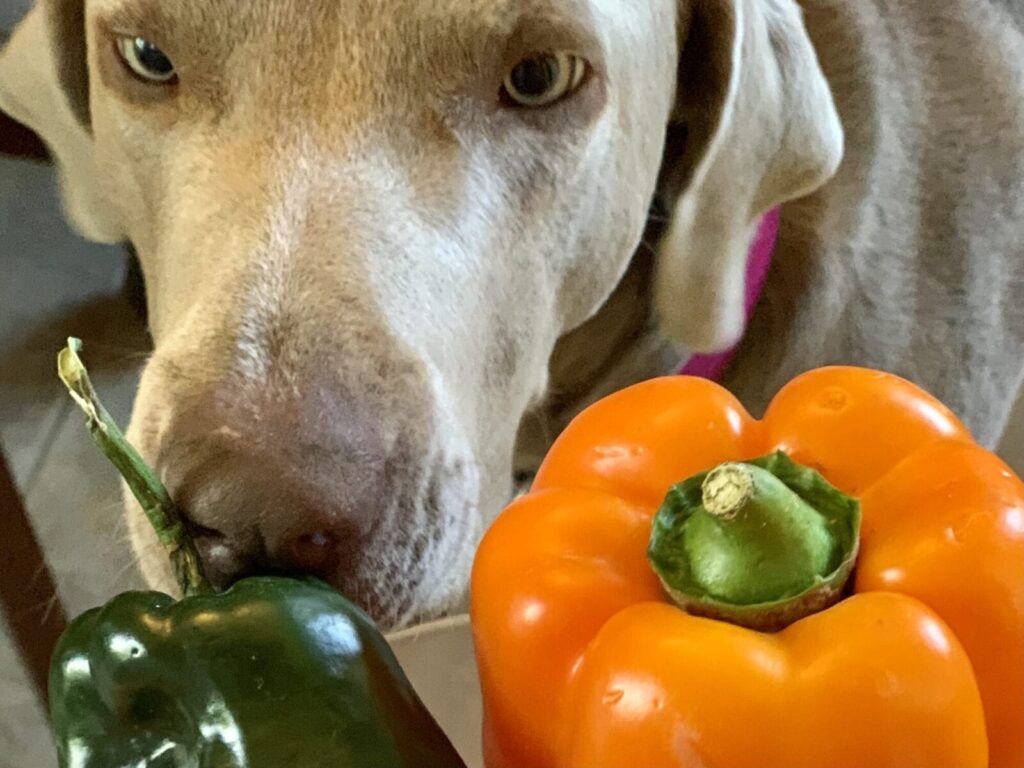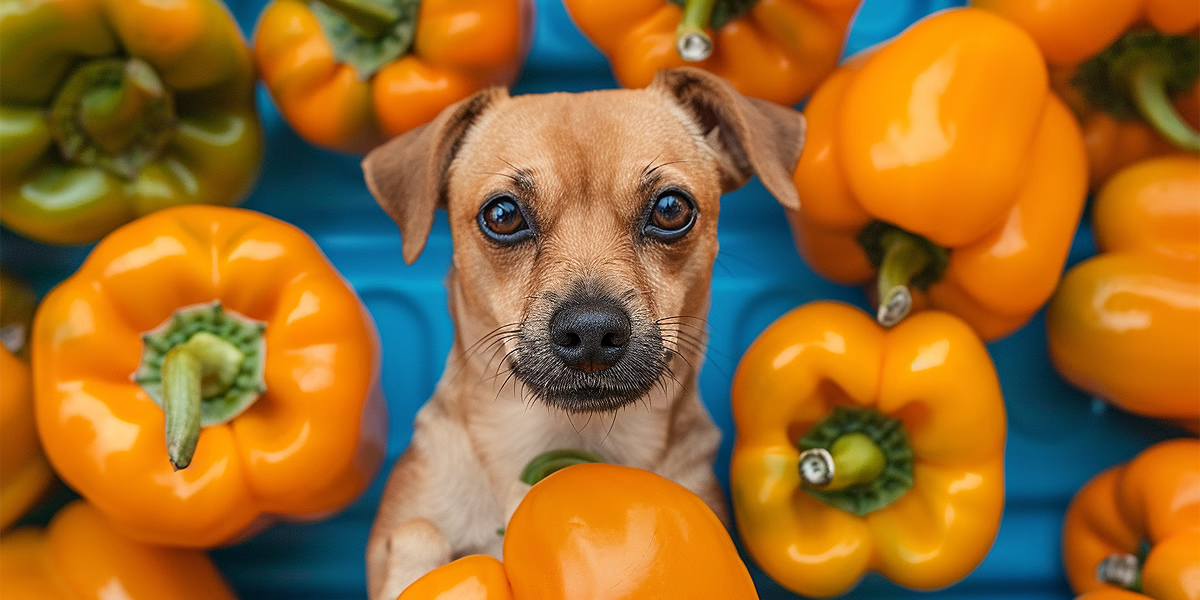Can Dogs Eat Bell Peppers, Bell peppers are a common vegetable in many human diets, but can dogs eat bell peppers? The answer is yes! Dogs can safely eat bell peppers, and they can even benefit from the nutrients these colorful vegetables provide. However, it’s important to follow some guidelines when feeding bell peppers to your furry friend. Let’s explore the safety, nutritional benefits, and the right way to incorporate bell peppers into your dog’s diet.
Nutritional Benefits of Bell Peppers for Dogs
Bell peppers, especially the red variety, are packed with essential vitamins and antioxidants that can be beneficial for your dog’s overall health. They are rich in vitamin A, vitamin C, and vitamin E, which help support a healthy immune system and contribute to a shiny coat and good vision. Bell peppers are also low in calories and fat, making them a healthy snack for dogs, especially those watching their weight. The high fiber content can aid digestion and contribute to maintaining a balanced diet.
Safe Ways to Feed Bell Peppers to Dogs
Can Dogs Eat Bell Peppers, while bell peppers are safe for dogs, it’s important to prepare them correctly to avoid any potential risks. Always remove the seeds and the stem, as they can be a choking hazard or cause gastrointestinal distress. It’s also best to cut the bell pepper into small, manageable pieces to ensure your dog can chew and digest them properly. If you choose to cook the bell peppers, avoid using any seasoning or oil, as these can upset your dog’s stomach.

Red, Green, Yellow Bell Peppers: Which is Best for Dogs?
Can Dogs Eat Bell Peppers, when it comes to bell peppers, not all colors are created equal. Red bell peppers are the most nutrient-dense of the three common types (red, green, and yellow). They contain the highest levels of vitamins and antioxidants, making them the best choice for dogs. Green bell peppers are less mature and have a slightly bitter taste, while yellow bell peppers fall somewhere in between in terms of ripeness and nutrient content. All three are safe for dogs, but if you’re looking for maximum health benefits, red bell peppers are the way to go.
Bell Pepper Allergies in Dogs
Can Dogs Eat Bell Peppers, Though rare, some dogs may have an allergic reaction to bell peppers. Signs of an allergy can include itching, redness, swelling, or digestive issues like vomiting and diarrhea. If you’re introducing bell peppers to your dog’s diet for the first time, it’s best to start with a small amount and monitor for any adverse reactions. If you notice any signs of an allergic reaction, discontinue feeding bell peppers and consult your veterinarian.
Portion Control: How Much Bell Pepper Can a Dog Eat?
Can Dogs Eat Bell Peppers, while bell peppers are a healthy treat, moderation is key. Too much fiber from vegetables can cause stomach upset in dogs, leading to gas, bloating, or diarrhea. A few small slices of bell pepper can be a tasty and nutritious addition to your dog’s meals or as a snack, but they shouldn’t make up a large portion of their diet. As with any new food, introduce bell peppers gradually and observe how your dog responds.
Raw vs. Cooked Bell Peppers for Dogs
Can Dogs Eat Bell Peppers, dogs can eat both raw and cooked bell peppers, but there are some considerations for each. Raw bell peppers retain all their nutritional value but may be harder for some dogs to digest due to their tough skin. Cooked bell peppers, on the other hand, are easier on your dog’s digestive system but may lose some nutrients during the cooking process. If you choose to cook the bell peppers, steaming is a good option as it preserves most of the nutrients without adding any unhealthy fats or seasonings.
Are Bell Peppers Safe for Puppies?
Puppies can also enjoy the health benefits of bell peppers, but extra caution should be taken due to their smaller size and more sensitive digestive systems. Always introduce bell peppers to puppies in small amounts and monitor for any signs of digestive upset. Be sure to remove the seeds and stems and cut the bell pepper into small pieces to avoid choking hazards.
Potential Side Effects of Bell Peppers in Dogs
Can Dogs Eat Bell Peppers, though bell peppers are generally safe for dogs, feeding them in excess can lead to gastrointestinal issues such as diarrhea, gas, or bloating. If your dog has a sensitive stomach or isn’t used to eating vegetables, start with a small portion and gradually increase the amount. Overfeeding bell peppers or any other vegetable can also lead to nutrient imbalances, so it’s essential to keep your dog’s diet balanced and varied.

Can Dogs Eat Spicy Peppers?
Can Dogs Eat Bell Peppers, It’s important to note that while bell peppers are safe for dogs, spicy peppers like jalapeños, chili peppers, or other hot varieties should be avoided. These types of peppers contain capsaicin, which can irritate your dog’s digestive system and cause discomfort. Always stick to mild peppers like bell peppers when offering vegetables to your dog.
Bell Pepper Dog Treat Recipes
Can Dogs Eat Bell Peppers, for pet owners who like to make homemade treats, incorporating bell peppers into dog-friendly recipes can be a fun and nutritious option. You can mix small pieces of bell pepper into your dog’s regular food, or bake them into dog treats along with other safe ingredients like sweet potatoes or carrots. Just be sure to avoid using any harmful seasonings, oils, or ingredients like onions or garlic, which are toxic to dogs.
Conclusion
So, can dogs eat bell peppers? The answer is a resounding yes! Bell peppers are a healthy, low-calorie treat that can provide your dog with a boost of essential vitamins and antioxidants. Whether you choose to feed them raw or cooked, red, green, or yellow, bell peppers can be a great addition to your dog’s diet when served in moderation. As always, consult with your veterinarian before introducing any new food to your dog’s diet, especially if your dog has known allergies or digestive sensitivities. By following these guidelines, you can safely enjoy sharing this colorful vegetable with your canine companion.
By introducing bell peppers to your dog’s diet, you’re providing a crunchy, nutritious snack that contributes to their overall well-being. Just remember to start small, prepare the peppers properly, and enjoy watching your dog munch on this tasty treat
Also read: Can Dogs Eat Cherries?





